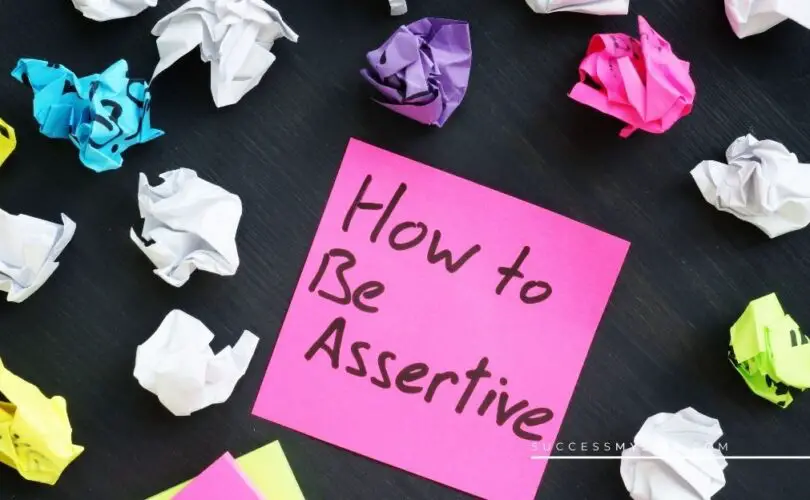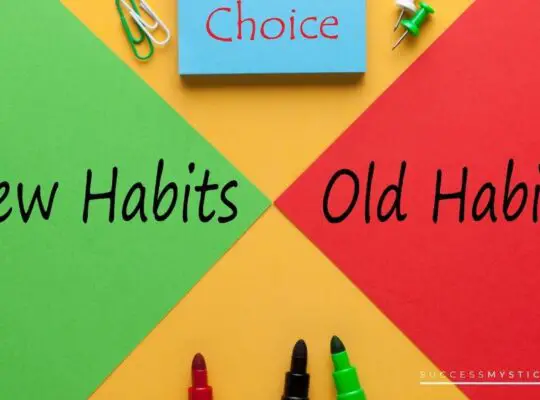Understanding Assertiveness
Being assertive is not about telling other people what to do. Instead, it is about communicating what you want and need to be happy and prosperous. It means setting firm boundaries and not being afraid to stand up for yourself and your needs. And when you become assertive, you start getting what you need and want in life. Being assertive means that are more likely to realize your goals, achieve recognition, and have the resources you need to be happy.
The guide will help you explore what it really means to be assertive in your life, how becoming more assertive can help you lead a happier and more successful existence, and how you can learn to become more confident with time and practice. When you follow these strategies, you can learn to improve how you communicate with others, how to value yourself as well as other people, and how you can start achieving what you want in your life.
Assertiveness often gets a bad reputation, but once you understand what it really means to act assertively, you will see that it is not a negative trait at all. Being assertive means that you are confident as well as self-assured all while not being aggressive toward others. Assertiveness is being confident in stating your views, feelings, or needs without the need to threaten others while also refusing to allow others to deny your rights or point of view.
When you are assertive, you value your own perspectives and needs as well as those of others. You see it as necessary that everyone is allowed to pursue their own dreams, and that no one should try to block someone else from their opinions or goals. It is a method of communicating with others that makes yourself clear, sets up boundaries that you can live with, and focuses on politely but firmly letting others know what you want, need, or think.
Being assertive means that you accept responsibility for your actions, thoughts, and needs and that you expect others to do the same for themselves. Being assertive also requires that you accept that you are fallible and will make mistakes, but that you will be the first to admit those and apologize when necessary. It is about being transparent, honest, and forthright with others so that they know what to expect from you.
An assertive communication style values listening as much as talking. You respect others because you expect them to do the same for you. Assertiveness means speaking clearly and directly, expressing your feelings, and never backing down from your values. In the same way assertive people ask for respect from others, they are also ready to give that respect to others, as well.
Becoming assertive can help you establish healthier boundaries in your personal and professional life, form strong relationships with others, become more productive, and actively work toward achieving your goals. In short, being assertive allows you to place your needs and dreams in high priority in your life, showing that you value your own happiness and success.
The Difference Between Assertive And Aggressive
People often struggle with the idea that being assertive is a positive trait because we are all taught to be nice to others. Somehow, being assertive has become associated with negative behaviors that are more accurately described as being aggressive. And these two ways of communicating and behaving are quite different. It is crucial that you understand how to differentiate between assertiveness and aggressiveness.
When you are aggressive, your goal is to dominate others, especially those you perceive as “weak” or “nice.” Aggressive people often feel as though they have the right to say whatever they want, with no concern for other people.
Aggressiveness often leads to behaviors that are egocentric or hurtful to others. Often, people who are aggressive are seen by others to be bullies or people who try to intimidate others.
It can be beneficial to be assertive with those who are aggressive to help them see how their behavior is not respectful of the needs or wants of others. If you care about someone who tends to be aggressive, it is vital that you become assertive with them, setting up healthy boundaries for the type of behavior you are willing to accept from them.
Being aggressive often involves threatening others, making them feel inadequate, or ignoring other people’s rights. Aggressive people tend to order others around, and they blame or accuse others of something that was their own fault. The goal of aggression is to make others feel “less than” or to completely ignore the feelings of the other person. You can see how this is vastly different from being assertive.
The Importance of Being Assertive
Learning to be more assertive can have enormous benefits for both your relationships with others as well as the relationship you have with yourself. Becoming more assertive can help to improve your personal life as well as your professional one. And learning to be more assertive will help you feel more confident in yourself, as well. Here are some of the many important benefits of becoming more assertive.
Your Self-Image Will Improve
The way you view yourself is your self-image. Your self-image influences how you see the rest of the world and how you behave. Becoming more assertive helps you to have a realistic view of yourself, as you do not view yourself as inferior or superior to others.
You have equal footing and therefore deserve similar respect. Having confidence enhances your ability to accept yourself as an equal to others, which raises your feelings of self-worth. You understand that you are not less than anyone else; you are simply different. And differences should be valued and respected and are not cause for shame.
You Will Understand Others More Fully
When you adopt a more assertive stance, you learn to value the view of others in a more realistic frame of mind. You no longer see that others are a threat to you when you see that their assertiveness is what is allowing them to achieve their dreams.
Being assertive also helps you realize that others rely on you for your strengths and skills, which makes you necessary for achieving their goals, in the same way you must depend on others to help you attain yours. When you learn to communicate your needs and wishes to others honestly, it helps you appreciate when others use the same style to communicate with you.
You Will Learn To Value Your Beliefs
Being assertive means that you think your views and ideas are important and worth. You respect your right to your opinion in the same way that you value others for theirs.
You become more comfortable expressing your perspectives, even when you know that others will disagree with you. Becoming assertive teaches you to acknowledge who you really are, which allows you to feel more confident and comfortable being yourself with others.
You Will Become More Efficient
When you learn to be assertive with others, you will not waste time and energy getting what you need or doing things that do not interest you. Choosing assertiveness allows you to tell others exactly what you need, which cuts wasted time.
Being assertive helps you avoid confrontation with aggressive people, too, which can help you feel less stressed and more productive. Being assertive ends the habit of ignoring situations until they become untenable and create an explosive situation that could have been avoided, as well.
Your Turn: How Assertive Are You?
Now that you understand what it means to be assertive and why learning assertiveness is important, it is time to examine just exactly how assertive you are currently.
For each of the following scenarios, consider how you would react normally. If you would respond, mark the statement with a positive or yes, and if you would not respond, mark it with a negative or no.
- If someone cut in front of you in a line, would you speak up?
- If you are angry with someone you love deeply, like your parents, are you able to tell them how you feel?
- Are you willing and able to ask others to do you a favor?
- Do you exchange things you bought when they are defective or not to your liking?
- Do you send back food in a restaurant that is not prepared as you ordered it?
- If you make a mistake, do you genuinely apologize to others?
- When someone drops by at a time that is very inconvenient for you, are you comfortable asking them to return later?
- When talking to a group of people, are you able to consider others’ feelings while also not censoring your own beliefs?
- If someone borrowed money from you but had not mentioned anything about paying you back, would you say something?
- Do you feel comfortable saying no to a salesperson who has gone above and beyond to help you, but you still do not want to buy their goods?
- Do you speak up when a store has given you the incorrect change?
- Are you comfortable pointing out when someone has made an untrue statement?
- Are you comfortable expressing your opinion to someone you respect but who vehemently disagrees with you?
- Do you feel comfortable refusing a request of a friend that seems unreasonable to you?
- If you needed it, would you ask a friend if you could borrow money?
- Do you point out when a store employee waits on someone who arrived after you?
- If someone you love is annoying you, do you point this out?
- If you shared something with a friend, who then reveals it to others, would you confront them about your hurt feelings?
- Can you tell other people when their teasing crosses a line and makes you uncomfortable?
- When you arrive late to an event, would you be able to take an empty seat in the front row comfortably?
- Do you feel comfortable defending your rights to others?
After answering each question, consider how many you answered positively and how many you answered negatively.
Your “no” or hesitant answers show areas where you lack assertiveness. Explore these situations and patterns to not any behaviors or clues that tell you about your choices.
Do you notice when you are more likely to assert yourself versus times when you struggle with this?
Questions like these can help you find the source of your fears and anxieties, which are interfering with your ability to assert yourself and stand up for your needs.
10 Tips To Become More Assertive
Learning to assert yourself means getting comfortable with telling others what you believe, feel, need, and want while also respecting those of other people. Assertive communication is a skill that, when used well, helps to reduce the friction and conflict in your life while also boosting your self-confidence and building your relationships with others.
If you want to learn to be more assertive, here are some tips to help you get started. Below, we will share with you more concrete strategies for how to behave and communicate more assertively, as well.
#1. Start by committing yourself that you will be more assertive. Setting this goal is a crucial step toward making it come true.
#2. Focus on learning to be more honest and open in your communication. Show respect for other people when discussing how you think and feel and ask that others show you the same in return.
#3. Remain calm. When you are learning to assert yourself, breathe slowly and deeply while keeping eye contact with the person to whom you are talking. Speak at a relaxed pace, too.
#4. Focus on solutions. When you assert yourself, do so in a way that offers solutions and assumes the other person is willing and able to help you.
#5. Actively listen. Understanding another’s point of view is crucial, so allow them to speak and genuinely try to hear what they have to say. You want them to do the same for you, so model this behavior.
#6. Focus on “I” statements. Use language that describes how “I feel” and “I think” to keep your tone assertive but not aggressive. Aggressiveness includes judgment and blaming as well as “never” and “always” type statements.
#7. Avoid guilt. Your goal is to explain your needs or thoughts, not to make the other person feel bad.
#8. Practice being assertive in many different situations. Use conversations with friends to help you ease your way into this communication style. Practice what you want to say in front of a mirror.
#9. Remember that your body language should be assertive, too. Stand tall and proud, make eye contact, and ensure that your body is communicating your confidence, too.
#10. It is not about right and wrong. You do not have to agree with everyone. You just need to state your perspective.
Learning to become assertive takes time, so be patient with yourself. There are some situations where it will be more difficult for you to assert yourself than others, and you may falter from time to time. It takes practice, but do not give up on the process.
Strategies For Learning To Become More Assertive
If you want to develop new, more assertive behaviors, then it takes practice and time. Learning new skills happen when you commit to a goal, work toward it steadily each day, and focus on the progress you are making. Below are many different strategies you can use to become more assertive. Choose the ones that work best for you.
1| Focus on Your Self-Confidence
One of the main reasons you may be struggling to be more assertive is that you lack confidence in yourself. When you have low self-worth, you may not feel capable of being assertive. When you base your value and worth on what other people think of you, you can become too concerned with whether they “like” you, which can prevent you from speaking your mind or standing up for yourself.
Being too focused on the opinions of others prevents you from being your authentic self, which is a way of limiting your existence. You are not truly yourself, which is why you do not feel as though you can be assertive. Look carefully at your own sense of self. Focus on becoming more confident in who you are, what you believe, and what you want in life. Learning to love yourself will raise your self-esteem and help you become the assertive person you want to be.
2| Stop Being Afraid
Another big reason that people do not act assertively is they are afraid. They do not want to have difficult conversations, they are afraid of upsetting other people, they can’t predict what will happen, or they do not want to disrupt a relationship they value. Fear is a powerful force, one that can keep you from living as your true self.
Courage is necessary to overcome fear. Courage is not being fearless; it is acting even when you are afraid. Start by taking small opportunities to keep pushing forward when you start to feel afraid. Practice daily acts of courage to build yourself up. When you stick to your values and beliefs, you will become more courageous, as well.
3| Focus On Behavior, Not People
When you are trying to be assertive with someone about something they have done, do not focus on them as a person. Instead, focus on the behavior that upsets you. The person is not offensive; the action is offensive.
You are not bothered by the person; you are upset by their deeds. Focusing on the act can help to prevent the other person from becoming defensive, which can make it easier to talk with them. Be specific and focus only on that one thing that is bothering you, so that the conversation can be productive, and you can assert your boundaries appropriately.
When you are first learning to be more assertive, it can be helpful to practice what you want to say and even to use a template that helps you communicate how you are feeling. For example, start by saying “When you do…” and describe what the person does that upsets you. Then, follow that with “I feel…” which keeps the message about your emotions and needs. Make it specific and focus on the use of “I” messages to describe how their behavior is affecting you.
4| Be Consistent In How You Communicate
It is crucial that you use consistent messages in your words, body language, and tone when trying to be assertive. If your words say one thing but your tone and nonverbal cues clearly say something else, others cannot take you seriously. Looking and sounding confident is just as crucial as using confident words and phrases.
5| Listen
When you are being assertive with someone else, it is important that you also listen to them. Allow them to respond to your concerns. Hear them so that they have the chance to accept responsibility, to discuss their perspectives, or to share their own hurt. Treating the other person with respect will also show where your own boundaries lie.
6| Value Differences
Being assertive is not about becoming dismissive of others’ points of view. When you disagree with someone, it is crucial that you do not allow these discrepancies to upset or anger you. Being assertive is not about being right; it is about sharing your views and making your needs known. Try to value the differences you have with other people and to understand their point of view, even if you can’t agree with them.
7| Use Simple and Direct Communication
The best way to be assertive is to say what you mean and mean what you say. Do not beat around the bush; do not use euphemisms or hints. Speak directly to the person to show that you value and respect them, you want to come to a mutual agreement, and you care enough about your relationship to try to mend your differences. Speak with truth and sincerity, being concise and stating your problem directly. The clearer you are, the more likely the other person is to understand what you want and need.
8| Remain Calm
When you try to be assertive at first, it may make you nervous or jumpy. This can make you come across as aggressive to others, so it is essential that you stay calm. Staying calm allows you to feel in control, which boosts your confidence. Focus on exhibiting calmness in your actions, speech, and thoughts throughout your exchanges with other people.
8| Remember The Goal Of Being Assertive
You are becoming assertive with someone so that they can understand how they are affecting you. The goal is to communicate your boundaries and ask for what you need. You have no control over how the other person responds, so stop worrying about their reaction. You can only control yourself, your thoughts, and your behaviors. Be respectful, say what you need to say, and trust that the rest is out of your hands.
9| Focus on Boundaries
What you will and will not tolerate for yourself are your boundaries, and you communicate these to other people through explicit and implicit rules and limits. When you can set and enforce your limitations, you will feel that other people value and respect you, which can enable you to be more assertive.
Boundaries communicate to friends, loved ones, and colleagues what you consider as acceptable behavior towards you and others, so be sure you are clear about your own boundaries and what you value in others’ actions.
10| Be Open to Others’ Feedback
Be willing to hear others’ compliments and criticism of you, as well. Showing that you are open to hearing how your actions affect other people will allow them to feel more willing to accept the same from you. If your actions are causing hurt or problems for others, be sure you are addressing these to show your mutual respect for them.
11| Be Able to Say “No”
When you are not used to being assertive, it can be hard to say “no” to other people. When you say “no,” you honor your own limits and boundaries, respect what it is you can do well and allow yourself enough time to engage in those things that fulfill you. When you refuse a request from someone, do so politely but firmly. Explain that you need to focus on something else, and while you value them, this is not something you can do at this time.
It’s Okay To Wait
It is not always easy to be assertive, especially when you are already emotionally charged. Sometimes, it is necessary to wait until you have calmed down and gotten distance from a situation before you can assert yourself productively.
Ask if you can take a few minutes to collect your thoughts. Explain that you were unprepared for this conversation and would like to think about the best way to respond positively. Be polite but take the time you need to have the conversation you need to have.
Final Thoughts
It is true that we all strive to be nice and well-liked. It is good to have friends and to get along with others. But being assertive does not mean that you must give up those things. It does not mean that you can’t be nice to others anymore.
It means that you value yourself just as much as you appreciate others, and you have the self-confidence to say what you need.
Learning to become more assertive can help you develop healthier, more stable relationships. It can provide you with the resources you need to carry out your goals and reach your dreams.
And it can allow you to live as yourself. Being assertive is an essential life skill that can allow you to be kind while still having what you need to be happy in life.
Stay assertive and take care!







